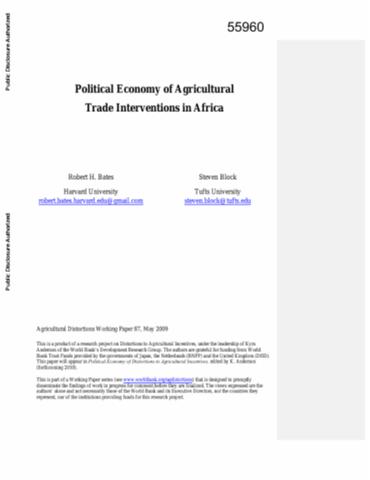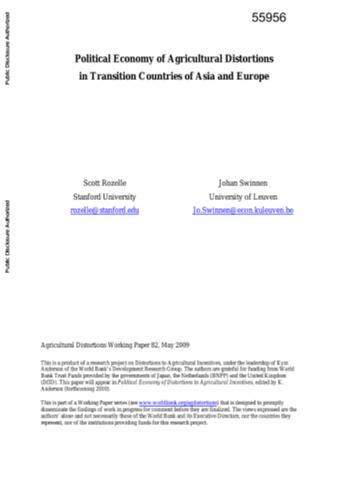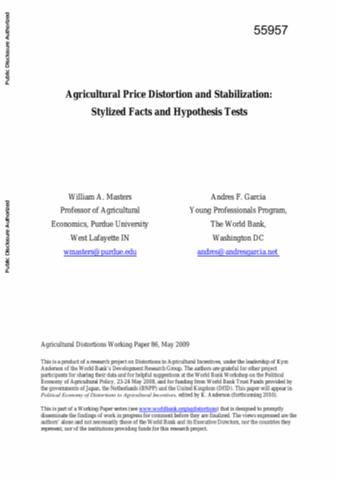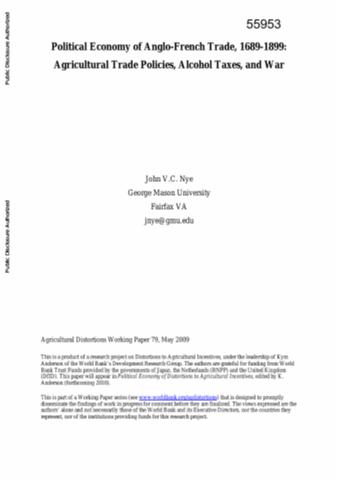The World Bank is a vital source of financial and technical assistance to developing countries around the world. We are not a bank in the ordinary sense but a unique partnership to reduce poverty and support development. The World Bank Group has two ambitious goals: End extreme poverty within a generation and boost shared prosperity.
- To end extreme poverty, the Bank's goal is to decrease the percentage of people living on less than $1.25 a day to no more than 3% by 2030.
- To promote shared prosperity, the goal is to promote income growth of the bottom 40% of the population in each country.
The World Bank Group comprises five institutions managed by their member countries.
The World Bank Group and Land: Working to protect the rights of existing land users and to help secure benefits for smallholder farmers
The World Bank (IBRD and IDA) interacts primarily with governments to increase agricultural productivity, strengthen land tenure policies and improve land governance. More than 90% of the World Bank’s agriculture portfolio focuses on the productivity and access to markets by small holder farmers. Ten percent of our projects focus on the governance of land tenure.
Similarly, investments by the International Finance Corporation (IFC), the World Bank Group’s private sector arm, including those in larger scale enterprises, overwhelmingly support smallholder farmers through improved access to finance, inputs and markets, and as direct suppliers. IFC invests in environmentally and socially sustainable private enterprises in all parts of the value chain (inputs such as irrigation and fertilizers, primary production, processing, transport and storage, traders, and risk management facilities including weather/crop insurance, warehouse financing, etc
For more information, visit the World Bank Group and land and food security (https://www.worldbank.org/en/topic/agriculture/brief/land-and-food-security1
Resources
Displaying 4726 - 4730 of 4907Political Economy of Agricultural Trade Interventions in Africa
This paper uses new data on agricultural policy interventions to examine the political economy of agricultural trade policies in Sub-Saharan Africa. Historically, African governments have discriminated against agricultural producers in general (relative to producers in non-agricultural sectors), and against producers of export agriculture in particular. While more moderate in recent years, these patterns of discrimination persist. They do so even though farmers comprise a political majority.
Political Economy of Agricultural Distortions in Transition Countries of Asia and Europe
This paper analyzes the political and institutional factors which are behind the dramatic changes in distortions to agricultural incentives in the transition countries in East Asia, Central Asia, and the rest of the former Soviet Union, and in Central and Eastern Europe. The paper explains why these changes have occurred and why there are large differences among transition countries in the extent and the nature of the remaining distortions.
Agricultural Price Distortion and Stabilization
This paper describes agricultural policy choices and tests some predictions of political economy theories. It begins with three broad stylized facts: governments tend to tax agriculture in poorer countries, and subsidize it in richer ones, tax both imports and exports more than nontradables and tax more and subsidize less where there is more land per capita.
Potential Climate Change Mitigation Opportunities in Waste Management Sector in Vietnam
Along with economic growth and improved living standards, waste from households, industries, and commercial or service establishments is expected to increase rapidly over the next years. Managing this waste is a hard challenge for the Government of Vietnam because of its substantial cost and lack of awareness and participation of people and businesses. Wastes can be classified according to: their form (wastewater, solid waste); their origin (industrial wastes, agricultural wastes, urban (municipal) wastes); and their hazardous nature (non-hazardous or hazardous).
Political Economy of Anglo-French Trade, 1689-1899
Britain contrary to received wisdom was not a free trader for most of the 1800s and, despite repeal of the Corn Laws, continued to have higher tariffs than the French until the last quarter of the century. War with Louis fourteenth from 1689 led to the end of all trade between Britain and France for a quarter of a century. The creation of powerful protected interests both at home and abroad led to the imposition of prohibitively high tariffs on French imports notably on wine and spirits, when trade with France resumed in 1714.










